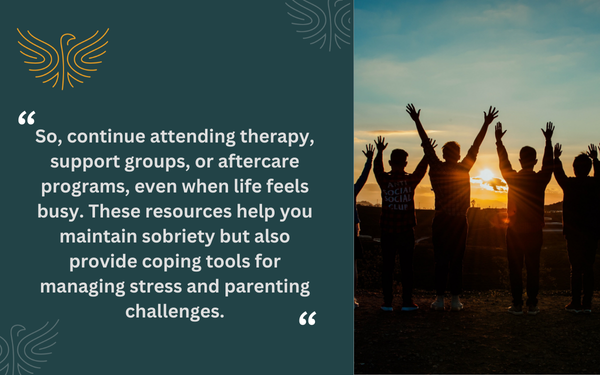Parenting is undeniably rewarding. But, as many parents know, it can also bring moments of uncertainty—and when recovery is part of your journey, those moments may feel even more significant.
Ultimately, becoming sober opens the door to rebuilding trust, creating stability, and deepening your connection with your children. Yet, it also introduces new responsibilities and adjustments along the way. So, how can you navigate this time in the best way possible and lay the foundation for a stronger and more connected future for your family?
_______________________________________________________
Tip #1: Prioritize Your Recovery First
Your recovery isn’t just about you—it’s the foundation for your entire family’s well-being. When you take care of your own healing, you gain the emotional stability, energy, and presence needed to show up fully for your children. It’s not selfish to put your recovery first; in fact, it’s one of the most loving things you can do for them.
So, continue attending therapy, support groups, or aftercare programs, even when life feels busy. These resources help you maintain sobriety but also provide coping tools for managing stress and parenting challenges.

Remember, your children learn from what you model. When they see you choosing healthy habits, setting boundaries, and staying committed to your growth, they gain a sense of security and hope.
Tip #2: Practice Open, Age-Appropriate Communication
Children are perceptive, meaning they often sense when something has changed, even if no one talks about it. Being open about your recovery helps build trust and creates a sense of safety for your kids. But make sure to tailor your communication to their age and emotional readiness.
For younger children, keep it simple and reassuring, such as “Mom/Dad is working on being healthy so we can spend more good time together.”
For older children and teens, you can provide a little more context without overwhelming them. Brief explanations about recovery and the positive changes you’re making can help them understand what’s happening and why.
It may also be beneficial to encourage your kids to ask questions and express their feelings, even if those feelings are hard to hear. Validate their concerns and let them know it’s okay to feel confused, worried, or hopeful. When children feel safe, heard, and informed, it strengthens their trust in you and creates a stronger emotional bond.
Tip #3: Rebuild Trust Through Consistency
Recovery is a decisive step toward healing, but rebuilding trust with your children often takes time. They may recall moments from the past when things felt uncertain, making it essential to show them reliability now. The most effective way to do this is through consistency.
In other words, be intentional about following through on the commitments you make, whether it’s attending a school event, being home for dinner, or sticking to weekend plans. Even simple, predictable routines like reading together before bed or sharing meals as a family can provide your children with a sense of stability and safety.
Consistency also means showing up emotionally—listening when they talk, being present during family time, and demonstrating patience as they adjust to this new chapter. Over time, these daily choices help rebuild trust and strengthen the bond between you and your children.
Tip #4: Set Healthy Boundaries and Routines
Structure creates stability for both you and your children. When you’re newly sober, establishing healthy routines can reduce stress, strengthen family bonds, and support your recovery journey.
Start with small, manageable steps, such as:
- Setting regular mealtimes and bedtimes to create predictability.
- Establishing technology limits so everyone can be more present together.
- Including daily check-ins or rituals, like sharing highlights from the day or reading together before bed.
Equally important is setting boundaries that protect your sobriety and emotional well-being. This might mean avoiding certain environments, limiting contact with people who don’t support your recovery, or saying no when obligations threaten your progress. And by doing so, you model healthy habits and provide your children with the stability they need to thrive!
Tip #5: Lean on Your Support Network
Parenting while navigating recovery is not something you have to do alone—and you shouldn’t. Surrounding yourself with a strong support network can make an enormous difference, both for your sobriety and for your ability to be present as a parent.
Recovery groups, therapy, and parenting workshops offer tools and guidance when challenges arise. Family counseling can also help rebuild communication and understanding within your household. If your treatment center provides aftercare programs, consider using them to stay connected to ongoing support and resources.
Reaching out for help is not a sign of weakness—it’s a sign of strength and commitment. Plus, when your children see you leaning on your community and practicing self-care, they learn that it’s okay to ask for help when they need it, too.
Tip #6: Focus on Progress, Not Perfection
Recovery and parenting both come with ups and downs—and that’s okay. There will be days when everything flows smoothly and others when you feel stretched thin. Instead of striving for perfection, focus on making consistent progress, one day at a time.
Celebrate small victories, whether it’s attending a meeting, keeping a promise to your child, or simply taking a moment to breathe when things feel overwhelming. These moments build confidence and remind you how far you’ve come.
And be gentle with yourself when challenges arise. Slip-ups or tough days don’t erase your efforts; they’re part of the journey. What matters most is showing up, learning, and continuing forward.
Tip #7: Create a Positive, Loving Home Environment
What matters most is creating an atmosphere where your children feel safe, valued, and loved. Small, intentional choices can make a big difference. Thus, make sure to spend quality time together—whether that means cooking dinner, playing a game, or sharing a bedtime story. And celebrate your family’s progress, no matter how small, and acknowledge each other’s efforts along the way.
Remember, recovery gives you the chance to create new traditions and memories built on stability, honesty, and love. Over time, these positive experiences form the foundation for a stronger bond and a brighter future for your entire family.
Parenting in recovery is a journey for you and your family. Every step you take toward sobriety creates new opportunities for trust, connection, and growth. If you or someone you love needs support, Freedom Recovery Centers (FRC) is here to help. Our compassionate team provides guidance, resources, and care for both individuals and families as you build a healthier, brighter future together. Call us at 804-635-3746 to learn more.
.svg)






.svg)

.svg)



.svg)
